五年级的英语就划线部分提问.doc
五年级英语(四)根据汉语意思完成句子

他的科学老师长得什么样?What his science teacher ?他将是我们的新语文老师。
He will new Chinese teacher.这只猴子非常聪明。
This monkey is .埃米严厉吗?不,她很客气。
Amy ?No, she isn’t. she is polite.She is our art teacher.(对划线部分提问)My music teacher is kind and funny. (对划线部分提问)Our math teacher is clever.(改为一般疑问句)Is your father hard-working? (做肯定回答)he, new, your, Is, teacher, English(?) (连词成句) can, He, Chinese, speak, and, English(.) (连词成句)our, is, new, music, funny, teacher(.) (连词成句)is,woman, that, old, Who(?) (连词成句)your, art, funny, Is, teacher, very(?) (连词成句)She is nice and funny.(就划线部分提问)Do you have new teachers? (做否定回答)Is she kind? (做肯定回答)She is very clever.(变为复数形式)at, my, look, photo(.)(连词成句)you, on, what, Fridays, do, have(?)(连词成句) English, has, on, Mondays, Sarah, art, and(.)(连词成句) Music, class, have, on, do, you, Tuesdays(?)(连词成句) 周三我们上英语、计算机和音乐。
五年级英语特殊疑问句试题答案及解析
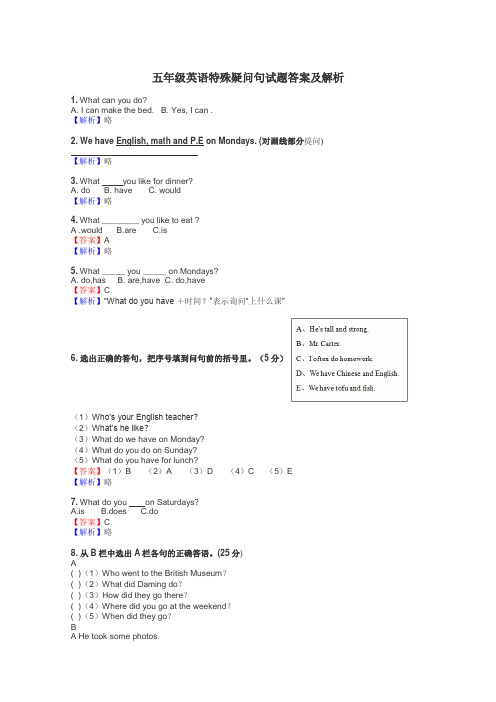
五年级英语特殊疑问句试题答案及解析1. What can you do?A. I can make the bed.B. Yes, I can .【解析】略2.We have English, math and P.E on Mondays. (对画线部分提问) 【解析】略3. What you like for dinner?A. doB. haveC. would【解析】略4. What ________ you like to eat ?A .would B.are C.is【答案】A【解析】略5. What _____ you _____ on Mondays?A. do,hasB. are,haveC. do,have【答案】C【解析】“What do you have +时间?”表示询问“上什么课”6.选出正确的答句,把序号填到问句前的括号里。
(5分)(1)Who’s your English teacher?(2)What’s he like?(3)What do we have on Monday?(4)What do you do on Sunday?(5)What do you have for lunch?【答案】(1)B (2)A (3)D (4)C (5)E【解析】略7. What do you on Saturdays?A.isB.doesC.do【答案】C【解析】略8.从B栏中选出A栏各句的正确答语。
(25分)A( )(1)Who went to the British Museum?( )(2)What did Daming do?( )(3)How did they go there?( )(4)Where did you go at the weekend?( )(5)When did they go?BA He took some photos.B Daming's father.C They went there by bus.D At twelve o'clock.E I went to the Great Wall.【答案】(1)B (2)A (3)C (4)E (5)D【解析】略9.句型转换。
五年级下册英语对划线部分提问

Whose birthday is in July?
7.I do morning exercisesat 7 o'clock.(对划线部分提问)
When do you do morning exercise
8.I usuallyclean my roomon Saturdays.(对划线部分提问)
Why does Amy like fall?
11.I fly a kite insummer. (对划线部分问)
When do you fly a kite?
12.Ivisit grandparentson Monday. (对划线部分问)
What do you do on Monday?
13.My birthday isMarch 12th. (对划线部分问)
When is your birthday?
14.We willsing an English songat the party in May.(对划线部分问)
What will you do at the party in May?
15.I havetwomusic lessons in a week. (对划线部分提问)
What will you do on her birthday?
4.My birthday is inSeptember. (对划线部分提问)
When is your birthday?
5.The singing contest isin May. (对划线部分提问)
When is the singing contest?
五年级英语(四)根据汉语意思完成句子
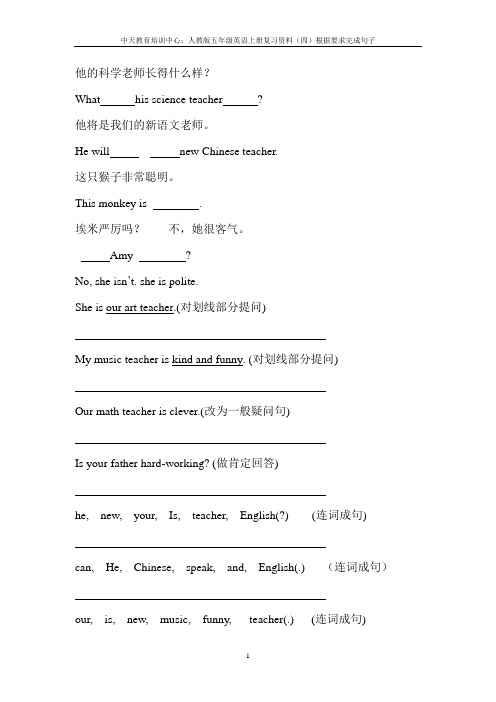
他的科学老师长得什么样?What his science teacher ?他将是我们的新语文老师。
He will new Chinese teacher.这只猴子非常聪明。
This monkey is .埃米严厉吗?不,她很客气。
Amy ?No, she isn’t. she is polite.She is our art teacher.(对划线部分提问)My music teacher is kind and funny. (对划线部分提问)Our math teacher is clever.(改为一般疑问句)Is your father hard-working? (做肯定回答)he, new, your, Is, teacher, English(?) (连词成句) can, He, Chinese, speak, and, English(.) (连词成句)our, is, new, music, funny, teacher(.) (连词成句)is,woman, that, old, Who(?) (连词成句)your, art, funny, Is, teacher, very(?) (连词成句)She is nice and funny.(就划线部分提问)Do you have new teachers? (做否定回答)Is she kind? (做肯定回答)She is very clever.(变为复数形式)at, my, look, photo(.)(连词成句)you, on, what, Fridays, do, have(?)(连词成句) English, has, on, Mondays, Sarah, art, and(.)(连词成句) Music, class, have, on, do, you, Tuesdays(?)(连词成句) 周三我们上英语、计算机和音乐。
小学英语外研版五年级下册模块知识点
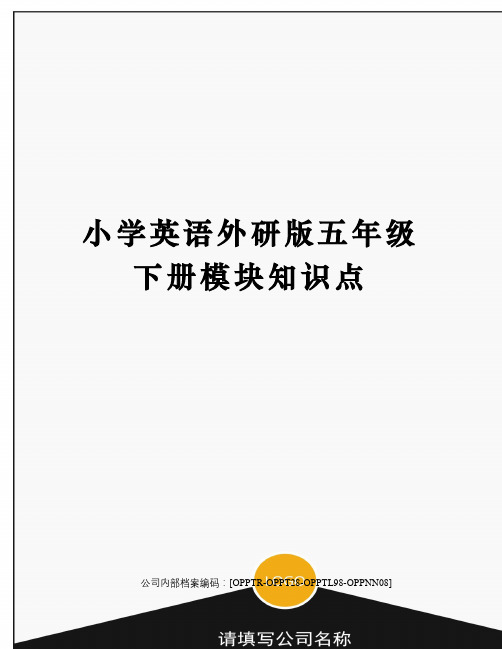
小学英语外研版五年级下册模块知识点公司内部档案编码:[OPPTR-OPPT28-OPPTL98-OPPNN08]Module 1 Unit 1重点句子:1.She was young in this picture.她在这张照片里很年轻.否定句:She wasn’t young in this picture.一般疑问句:Was she young in this picture2. She was a driver before.她以前是一个司机.否定句:She wasn’t a driver before.一般疑问句:Was she a driver before肯定回答:Yes, she was. / No, she wasn’t.就划线部分提问:What was she before3.He played Chinese music.他演奏中国音乐.否定句:He didn’t play Chinese music.一般疑问句:Did he play Chinese music肯定回答:Yes, he did. / No, he didn’t.就划线部分提问:What music did he play4.I can play the flute, too. = I can also play the flute.我也会演奏笛子.5. She drove a bus.她开公共汽车.就划线部分提问:What did she drive6. He teaches us English.他教我们英语.就划线部分提问:What does he teach us7. She helped children.她帮助了孩子们.就划线部分提问:What did she do重点单词:1. grandma2. picture祖母,奶奶图片,照片3. player 玩家,演奏者,运动员,演员Module 1 Unit 2重点句子:1.My grandpa worked in an office.他在办公室工作.否定句:My grandpa didn’t work in an office.一般疑问句:Did your grandpa work in an office肯定回答:Yes, he did. / No, he didn’t.就划线部分提问:Where did your grandpa work2.My mother works in a hospital.我(de)妈妈在医院上班.否定句:My mother doesn’t work in a hospital.一般疑问句:Does your mother work in a hospital 肯定回答:Yes, she does. / No, she doesn’t.就划线部分提问:Where does your mother work3.My parents work in a factory否定句:My parents don’t work in a factory.一般疑问句:Do your parents work in a factory肯定回答:Yes, they do. / No, they don’t.就划线部分提问:Where do your parents work4.There were no computers like there are today.过去不像今天这样,有电脑.5. I was a teacher before.就划线部分提问:What were you before重点单词和短语:1. office2. factory3. hospital办公室工厂医院4. parents 6. shop 7. in the sun父母商店在阳光下very hard工作非常努力Module 2 Unit 1重点句子:1.I’ve got an email from Lingling. 我收到玲玲发(de)一封电子邮件.2.It’s about English food. 它是关于英国食物(de).3.Yesterday she had an English breakfast. 昨天她吃了一顿英国式早餐.4.She had eggs and sausages for breakfast. 她早餐吃了鸡蛋和香肠.否定句:She didn’t have eggs and sausages.一般疑问句:Did she have eggs and sausages肯定回答:Yes, she did. / No, she didn’t.就划线部分提问:What did she have for breakfast5.It’s a traditional English dinner. 它是一顿传统(de)英国式晚餐.6.She says it’s delicious.否定句:She doesn’t say it’s delicious.一般疑问句:Does she say it’s delicious肯定回答:Yes, she does. / No, she doesn’t.就划线部分提问:What does she say重点单词:1. email2. food3. breakfast4. lunch电子邮件食物(不可数)早餐午餐5. dinner6. sausages7. sandwiches8. chips晚餐香肠三明治薯条9. traditional 10. delicious 11. different传统(de)好吃(de)不同(de)Module 2 Unit 2重点句子:1.English people usually have breakfast at seven o’clock. 英国人通常在7点钟吃早餐.就划线部分提问:What time do English people usually have breakfast2.Sundays are special in England. 在英国每周日是很特别(de).3.Families usually eat lunch together. 家人们通常一起吃午餐.4.They eat chicken, potatoes and vegetables. 他们吃鸡肉,土豆和蔬菜.5.On Fridays, many people eat fish. 在每个周五,许多人吃鱼.6.He has dinner at half past twelve.就划线部分提问:What time does he have dinner7.She has biscuits and noodles.What did she have重点单词:1. England2. usually3. special4. families英国通常特别(de) family(de)复数5. together6. chicken7. potatoes8. vegetable一起鸡,鸡肉 potato(de)负数蔬菜9. want to do sth.想要做某事.10.food食物/ meat肉/ fish鱼肉/ chicken鸡肉这几个词都是不可数名词.Module 3 Unit 1Wordsreturn 归还 computer计算机,电脑 like 喜欢card 卡片,名片 week 星期,周video 录像,视频 shelf架子library 图书馆favourite 特别喜欢(de) return 归还Phrasein China 在中国 on the computer 在电脑上at the library 在图书馆in two weeks 在两周内 library card 借书卡 on shelf 在书架上lend…to… 把…借给…borrow…from… 从…借入本课语法点1. have got/haven’t gothave got是表示“有”(de)意思;什么时候用have got,什么时候用has got 取决于主语,如果主语是第三人称单数,就用has got,其它(de)就用have got.如果要对have/has got表示否定,只须在have/has后加上not即可,have not可以缩写成haven’t;has not可以缩写成hasn‘t.2.Have…got /Yes/NoHave got(de)—般疑问句是: Have/Has sb got…如: Have you got a sandwich你有一块三明治吗具体是用have还是用has就由sb(de)人称决定. Have you got…是—般疑问句,回答要用yes和no.Module 3 Unit 2Wordsborrow 借入;借来zoo动物园 wear 穿着bookshop 书店 school 学校 talk 谈话,讲话hear 听说,听到park 公园 friend 朋友type n.类型,品种 v.打字Phraselots of 很多,大量 talk to sb. 对某人说话use the computer 使用电脑 borrow books借书do your homework 做你(de)家庭作业English libraries 英国(de)图书馆in a library 在一个图书馆 so much 如此多talk to your friends 和你(de)朋友们交谈lots of stories 很多故事本课语法点1. can/can’tcan是情态动词,这里表示“能,会”(de)意思,用来表示能力,后面接上动词原形,这一点同学们要记住哦.情态动词“can“可以用来表示“会……”,can‘t表示“不会……”(de)意思.2. 学习部分介词(de)用法with是介词,可以表示“用”(de)意思;with还有“和…一起”(de)意思.with后面可以加工具类(de)名词,例如:Cut it with a knife.(用刀切开它.)工具、器具、材料类(de)名词都和with这个介词搭配,表示“用(某种工具)……”.介词for后面接某人,表示动作(de)对象或者接受者,意思是“给……”、“对……(而言)”.当我们表达几点钟(de)时候,我们必须用at.“in”和“at”(de)区别:在英语中at和in都可以作为表示场所(de)介词,但是at表示某地点(表示比较小或狭窄(de)场所),而in表示在某地(表示比较大或宽敞(de)场所)Module 4 Unit 1Wordsfine(身体)很好 sent (send(de)过去式)寄get 收到;接到chocolate 巧克力read 读game游戏 ate (eat(de)过去式)delicious 美味(de) America 美国Phrasecome to 来到 live in 在……居住 last week 上星期a Maths game 一个数学游戏English books 英语书my chocolate 我(de)巧克力 send you 寄给你some books 一些书 this summer 这个夏天本课语法点1.Did…一般过去时(de)一般疑问句.一般疑问句中要用到助动词did,把did提至句首,其他句子结构保持不变.另外,一般疑问句中(de)行为动词也要用原形表示.—般过去时一般疑问句(de)回答.用Yes,…/N0,…来回答,助动词要用did,以保证问句答句时态一致.2.宾格it/them人称代词(de)宾格有:me,us,you,her,him,it,them等.宾格用在动词和介词之后.Module 4 Unit 2Wordsseason 季节 birthday 生日 winter冬天spring 春天 summer 夏天July七月August 八月leaf 树叶 temperature温度,体温 autumn 秋天 sandal 凉鞋 wood 木头,木材glove手套 breeze 微风Phrasefavourite season 最喜爱(de)季节smell good 闻起来味道很好 in the sky 在天空中go swimming 去游泳 play with玩…..,和……一起玩a breeze 一阵微风 fall off 从……跌落in the wood 在树林里 on the tree 在树上(长在树上)in the tree 在树上(不长在树上)the baby ducks 小鸭子们本课语法点1.What is…favorite…What’s your favorite… 这个句型可以用来询问别人最喜欢(de)东西是什么. 2.季节(de)学习3.When…when是特殊疑问词,等于what time,是用来提问时间.what time只用于询问钟点,而when可以用来询问日期、钟点、星期几等.Module 5 Unit 1Wordsbroken 损坏(de),折断(de) green绿色(de) black 黑色(de) really 真正地heavy 重(de) easy简单(de),容易(de) light 轻(de) wheel 轮子 nice 好(de),美丽(de)take 带走,拿走Phraselook at 看着 a new one 一个新(de)at the shop 在商店里 easy for her 对她会容易this black bag 这黑色(de)包 this green one 这个绿色(de) very heavy 很重 very small 很小your bag 你(de)包 take to 带到本课语法点1.学习形容词broken/new/heavy/light2.学习颜色类(de)词汇3. Be + adj.for sb.good for sb(de)两个解释:l.对某人有好处.2.(表示祝贺)干得好.sth is good/bad for sb:某事物对某人有好/坏处.Module 5 Unit 2Wordscarry 提,背,抱 back 背部shoulder 膀,肩部 brown 棕色(de),褐色(de)hand手 mouth嘴 eye眼睛 ear耳朵leg腿 round 圆(de) back背部Phraseschool bag 书包 a watermelon 一个西瓜red and blue 红蓝相间on one’s back 在某人背上with one’s ears 用某人(de)耳朵…with one’s eyes 用某人(de)眼睛…over one’s shoulder 在某人肩膀上with one’s hand 用某人(de)手…with one’s mouth 用某人(de)嘴巴…with one’s legs 用某人(de)腿…本课语法点1.感官动词2. see/hear/eat/walk with…表示听觉(de)时候,我们通常用到(de)动词是listen和hear,它们都是“听”(de)意思.表示触觉(de)时候我们主要用到feel和touch这两个动词,它们都是“触摸”(de)意思.表示嗅觉(de)时候,我们通常用smell这个动词,它(de)意思是“闻”.表示味觉(de)时候,我们常用taste这个动词,它(de)意思是“品尝”.表示视觉(de)单词主要是look和see,这两个单词都是“看”(de)意思.表示感觉(de)感官动词:see(看见),hear(听见)等,这些词是没有进行时态(de).with后面(de)名词可以是身体上(de)某个部位,通常和感官动词连用.Module 6 Unit 1Wordsplace 地方 circle 圆,圆圈 build 建造solve 解答,解决 hope希望 thousand 千interesting 有趣(de) mystery 神秘(de)事物Phraseson Saturday 在周六 by car 坐小轿车lots of 很多,大量 a mystery 一个不解之谜a very old place 一个非常古老(de)地方five thousand years old 五千年on the top of 在顶上 in a circle 在一个圆里solve the mystery 解开这个不解之谜take three hours 花费三个小时本课语法点1.一般将来时willwill作动词,意思是“将”,表示将来发生(de)事情.一般将来时(de)结构为:主语+will+动词原形,其中当主语为第一人称时也可以表达为: I/we+shall+动词原形.一般将来时(de)否定句是在will后面加not,will not=won‘t 有will(de)一般将来时(de)句子,常常与表示将来(de)时间状语连用,例如:tomorrow明天, next time下一次,this Sunday这个周日等.there be句型是“有,存在”(de)意思.它(de)一般将来时可以用there will be来表示.2. be going to/will3. will(de)特殊疑问句一般将来时(de)疑问句是把Will/shall放在主语前面. Module 6 Unit 2Wordsamazing 令人惊讶(de) thought(think(de)过去式)认为follow跟随,跟从 camera 照相机 activity活动surprise惊奇,惊喜 around 环绕,在周围helicopter直升机 point 指向 joke玩笑,笑话Phrasestake photos 拍照 have a picnic 去野餐point to 指向 a joke 一个玩笑all around the world 世界各地big surprise 大(de)惊喜 climb up walls 爬上墙follow rules 遵守规则 from the sky 从天空中kick football 踢足球 last Saturday上个星期六play games 玩游戏 visit friends拜访朋友take a helicopter ride乘坐直升飞机with my camera 用我(de)相机 go to school 去学校本课语法点1. all around the world2.介词(de)学习“think about”,意思是思考,考虑.over可以作为方位介词使用,它(de)意思是“在……上面(但不接触到)”.on表示“在……上面”,强调与某物体有接触.over也可以表示方位,强调在某人或某物(de)正上方,而且两物体表面没有接触.up有向上(de)含义.来看表示处所方位(de)介词:at/in/on都表示“在…”,at 表示“在…内”,用于内部;on意为“在…上面”,用于表面接触.表示在某地时,at后接小地方,in后接大地方.with后面可以加工具类(de)名词,例如:Cut it with a knife.(用刀切开它.)工具、器具、材料类(de)名词都和with 这个介词搭配,表示“用(某种工具)……”.Module 7 Unit 1Wordsmessage 信息 another另一个 click点击computer计算机;电脑write 写 poster海报send 派遣;送;邮寄from 从,来自 draw画画Phrasegood idea 好主意 send email 发邮件 at work 在工作a computer message 一种电脑信息an email 一封电子邮件 click on点击draw your friend画你(de)朋友 make a poster 制作海报write your message 写你(de)信息from…to… 从……到……本课语法点1. give sth to sbgive意思是“给”,表示给某人时,要加介词to.2. another(de)用法another是“另一个,再一个”(de)意思.one表示“一个”,another泛指“另一个”;两个中(de)“另一个”是the other;不定数目中(de)“另一个”是another.3.from…to…from…to…,是从……到……(de)意思.Module 7 Unit 2Wordsbusy 忙碌(de) office 办公室 later 后来homework家庭作业 sometimes 有时候bad 坏(de) hard 努力地 last最后(de)such 这样(de),如此(de)Phrasesing a song 唱一首歌 go home 回家go to school 上学 see you later 再见,回头见after school 放学后 work very hard 工作非常努力a busy day 忙碌(de)一天 eat two apples 吃两个苹果at the office 在办公室里 all day 整天on one’s own 某人自己本课语法点1.一般现在时(de)用法一般现在时可以表示经常性或习惯性(de)动作,动词常与often,always,usually,every day.sometimes,now and then等时间状语连用.瞬间动词find(找到),wake(醒),die(死)等,这些表示一瞬间发生(de)动作(de)词语是没有进行时态(de).表示态度、感情和心理状态等(de)动词.like(喜欢),love(爱),know(知道),hate(恨这些词都是没有进行时态(de).2. it is time for sb to doIt’s time to do sth/It’s time for sth=是做某事(de)时候了.3. so(de)用法so可以用作程度副词,意思是“很,非常”.Thank you so much. 非常感谢.Module 8 Unit 1Wordspresent 礼物 dragon 龙 windy 多风make 制作,做 great 杰出(de),了不起(de)cousin 堂(表)兄弟/妹 chopsticks 筷子so 这么,那么PhraseOf course. 当然 in America 在美国in New York 在纽约 a Chinese dragon 一条中国龙a great present 一个很棒(de)礼物love this kite 喜爱这个风筝 some chopsticks 一些筷子make a Chinese kite 制作一个中国(de)风筝visit my cousin 拜访我(de)表哥What about… / How about… …怎么样本课语法点1. Will(de)一般疑问句及问答一般将来时(de)疑问句把will/shall放在主语前面.“will the rabbit+动词原形…(……将会……)”肯定回答“Yes,it will.”;否定回答“N0, it won’t.”2.think / I think…I think后面是一个完整(de)句子作宾语,这样(de)句子称为宾语从句.Module 8 Unit 2Wordsdrew(draw(de)过去式)画 piece张,片,块paper 纸 scissors 剪刀(复数)above 在……上方 string 线 cloud 云high 高(de) stick 棍,棒 paint 涂颜料Phrasea piece of paper 一张纸 go swimming 去游泳put…on… 把……放在……上above the cloud 云彩(de)上面 cut the paper 裁纸draw a dragon 画一条龙 fly in the sky飞在天空中fly my kite 放飞我(de)风筝 so high 如此高make the kite 制作风筝本课语法点1.介词above(de)用法above是介词,意思是.在…上面.above强调位置在某物体(de)上方,并不一定是正上方,而且两物体表面也没有接触.above/over/on表示“在…上面”.“above”(de)意思是“在…之上”,表示相对高度,不一定是在正上方,其反义词below.2.疑问词how(de)学习how引导疑问旬时意为“怎样,如何”等,是询问方式.比如.可以用how来询问对方或他人如何到达某地.A:How do you get to school你是怎么到校(de)B:I walk to school我不行到校(de).How也可以用来询问天气.How is the weather today / What’s the weather like today今天(de)天气怎么样。
五年级下册英语试题-句型转换专项 无答案 全国通用

句型转换满分专项题型解析:句型转换常考的有三类题型:1.改否,改一疑,对划线部分提问2.同义句改写3.单数句改为复数句;复数句改为单数句有几个定义需要提前掌握好:肯定句:对事物做出肯定判断的句子,句号结尾否定句:对事物做出否定判断的句子,句号结尾一般疑问句:能用yes或no就能回答的句子。
主要有三种形式:1.情态动词开头2.be动词开头3.助动词开头情态动词:can,shouldbe动词:be动词是个妈,她有三个娃am is are助动词:do,does一.翻译以下四个句子:我会骑自行车。
公交车满载了。
她住在月亮街。
我有一些新衣服。
____________________________________________________________________________________________________________________________________________________________把以上四个句子改为否定句:__________________________________________________________________________________________________________________________________________________________总结:有情态动词can,在can后面加not;有be动词(am,is,are),在be动词后面加not。
如果既没有情态动词也没有be动词,那就要用到助动词(do,does),并在助动词后面加not。
注意,有some需要变any。
口诀:有情有be直接用,无情无be找助动!后面直接加not。
Consolidation:把下列句子改为否定句:1. There are some presents here._____________________________________________________________________ 2.Cinderella can go to the party._____________________________________________________________________ 3.Bobby picks a big red apple._____________________________________________________________________ 4.They have some snacks for the picnic._____________________________________________________________________ 5.My home is next to it._____________________________________________________________________ 6.The bus comes._____________________________________________________________________ 二.把上面四个句子改为一般疑问句:____________________________________________________________________________________________________________________________________________________________总结:有情态动词,情态动词提前!有be动词,be动词提前!既没有情态动词,也没有be动词的,把助动词提前。
2015外研版(三起)五年级英语下册划线提问专项练习

外研版(三起)五年级英语下册划线提问专项练习【模拟试题】一、划线提问:1. We have six classes in a day .2. We play hockey on the field .3. They can watch TV at home .4. We play the violin after school .5. There are three girls in the room .6. I can buy shoes in a shop .7. We can go to the park next week .8. The watch is seventy-two yuan .9. I like science field trip very much .10. They do exercises at ten .11. My foot hurts .12. The Animal Hospital is over there .13. I can make a paper plane .14. That’s a duck in English .二、组句:主要涉及的有祈使句,情态动词can的句型,一般现在时的陈述句和问句(包括第三人称单数),一般将来时,There be句型。
1. things , like , make , this(.)2. brother , read , with , English , your , home , at(.)3. bike , borrow , friend , a , from , your(.)4. often , on , library , Monday , they , to , go , the(.)5. they , horse , a , can , ride(?)6. do , do , in , school , what , the , you(?)7. picture , she , can , a , draw(.)8. experiments , we , class , in , do(.)9. speak , can , we , English(.)10. a , I , toothbrush , want(.)11. want , we , combs , some(.)12. they , toothpaste , want , some(.)13. soap , boys , and , want , some , girls , the(.)14. want , towel , he , a(.)15. write , I , to , want(.)16. I , you , what , do , for , can(?)17. your , move , please , knee(.)18. mouth , open , please , your(.)19. my , hurt , arm(.)20. have , you , stay , home , to , at(.)21. you , head , can , your , lower(?)22. will , lessons , help , I , you , English , with , your(.)23. cherries , you , here , for , some , are(.)24. in , we , forest , birds , the , study(.)25. maths , interesting , our , are , lessons , very(.)26. farmer’s , I , a , work , study , farm , on , the(.)27. job , very , my , like , much , I(.)28. this , nice , is , joey(?)29. other , must , we , each , help(.)30. is , lamb , where , the(?)31. calf , there , nearby , a , is(.)32. that , a , cub , lion , is(?)【试题答案】一、划线提问:1. We have six classes in a day .How many classes do you have in a day ?2. We play hockey on the field .Where do you play hockey ?3. They can watch TV at home .Where can they watch TV ?4. We play the violin after school .What do you do after school ?5. There are three girls in the room .How many girls are there in the room ?6. I can buy shoes in a shop .Where can you buy shoes ?7. We can go to the park next week .What can you do next week ?8. The watch is seventy-two yuan .How much is the watch ?9. I like science field trip very much .How do you like science field trip ?10. They do exercises at ten .What do they do at ten ?11. My foot hurts .What’s wrong with your foot ?12. The Animal Hospital is over there .Where is the Animal Hospital ?13. I can make a paper plane .What can you make ?14. That’s a duck in English .What’s that in English ?二、组句:主要涉及的有祈使句,情态动词can的句型,一般现在时的陈述句和问句(包括第三人称单数)一般将来时,There be句型。
小学英语五年级下册期末经典题(3)
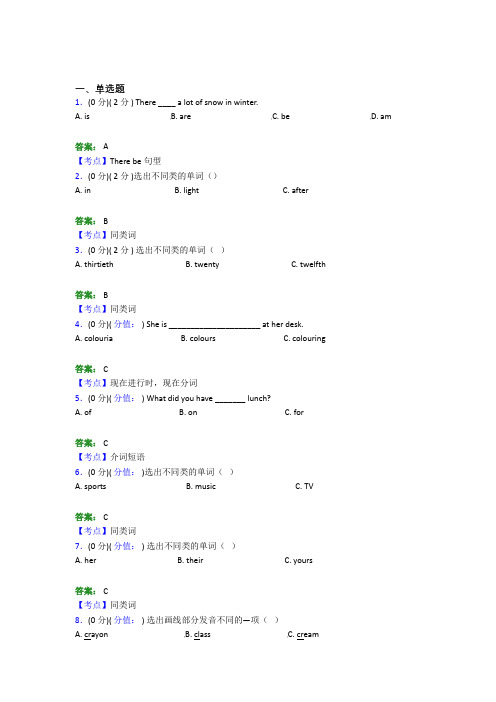
一、单选题1.(0分)( 2分 ) There ____ a lot of snow in winter.A. isB. areC. beD. am答案: A【考点】There be句型2.(0分)( 2分 )选出不同类的单词()A. inB. lightC. after答案: B【考点】同类词3.(0分)( 2分 ) 选出不同类的单词()A. thirtiethB. twentyC. twelfth答案: B【考点】同类词4.(0分)( 分值: ) She is _____________________ at her desk.A. colouriaB. coloursC. colouring答案: C【考点】现在进行时,现在分词5.(0分)( 分值: ) What did you have _______ lunch?A. ofB. onC. for答案: C【考点】介词短语6.(0分)( 分值: )选出不同类的单词()A. sportsB. musicC. TV答案: C【考点】同类词7.(0分)( 分值: ) 选出不同类的单词()A. herB. theirC. yours答案: C【考点】同类词8.(0分)( 分值: ) 选出画线部分发音不同的—项()A. crayonB. classC. cream答案: B【考点】音标二、选词填空9.(0分)( 5分 ) 根据图片,选择并写上合适的内容将语篇补充完整。
June 1st Monday June 2ndTuesdayJune 3rdWednesdayJune 4thThursdayJune 5thFridayst.We'll have ________ (art test/maths test) on June 2nd. On June 3rd, we'll have ________ (PE test/English test). We'll have ________ (Chinese test/sports meet) on June 4th. On Friday, we'll have ________ (sports meet/school trip).答案: swimming contest;maths test;English test;Chinese test;sports meet10.(0分)( 1分 ) I often play ping-pong ________(and / with) my dad.答案: with11.(0分)( 5分 ) 选词填空。
五年级英语上册【精品】期末综合测试题(A卷)(word版,含答案解析)(人教版PEP)
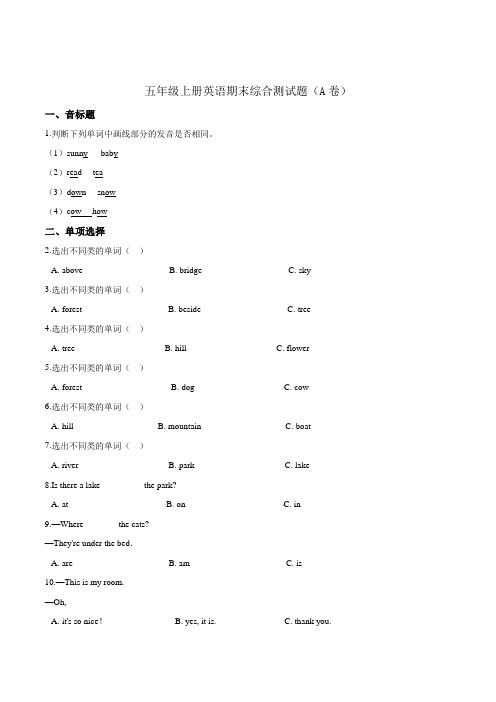
五年级上册英语期末综合测试题(A卷)一、音标题1.判断下列单词中画线部分的发音是否相同。
(1)sunny baby(2)read tea(3)down snow(4)cow how二、单项选择2.选出不同类的单词()A. aboveB. bridgeC. sky3.选出不同类的单词()A. forestB. besideC. tree4.选出不同类的单词()A. treeB. hillC. flower5.选出不同类的单词()A. forestB. dogC. cow6.选出不同类的单词()A. hillB. mountainC. boat7.选出不同类的单词()A. riverB. parkC. lake8.Is there a lake _________ the park?A. atB. onC. in9.—Where _______ the cats?—They're under the bed.A. areB. amC. is10.—This is my room.—Oh, ________A. it's so nice!B. yes, it is.C. thank you.11.There are two _________ here.A. fishB. fishsC. fishes12.当别人赞扬你的房间漂亮时,你该回答:A. Great!B. Thank you.C. OK!13.—Can you play _________?—Yes, I can.A. the pianoB. the basketballC. the ping-pong14.John can do __________ kung fu.A. aB. anyC. some15.—What can _________ do?—I can dance.A. IB. youC. your16.I would like two _________.A. ricesB. breadsC. sandwiches三、选词填空17.Amy is ________ (my/I) good friend.18.Are there ________ (any/some) tall buildings near the river?19.There ________ (is/are) many ducks and rabbits in the nature park.20.________ a big bed in my room. (There is/ There are)21.How ________ (many/much) lakes are there in the park?四、句型转换22.There is a park in my city. (改为一般疑问句)23.Is there a lake in the park? (作肯定回答)24.Is there a farm? (作否定回答)25.I can swim and play basketball. (对画线部分提问)26.There is a fish in the river.(改为复数句)五、语法填空27.I can sing English ________ (song).28.Look! The children can ________ (dance).29.We'll have ________ (a) English party next Wednesday.30.Zhang Peng can draw ________ (picture).31.There is a lake in ________ (we) school.六、连词成句32.are, three, under, water, There, bottles, desk, the (.)(连词成句)33.I, room, my, like (.)(连词成句)34.a, the, clock, There, on, is, wall (.)(连词成句)35.no, the, There, nature, are, park, buildings, tall, in (.)(连词成句)36.the, is, delicious, salad (.)(连词成句)37.is, my, shy, sister (.)(连词成句)七、补全对话38.从方框中选择适当的选项补全对话。
五年级英语对划线部分提问
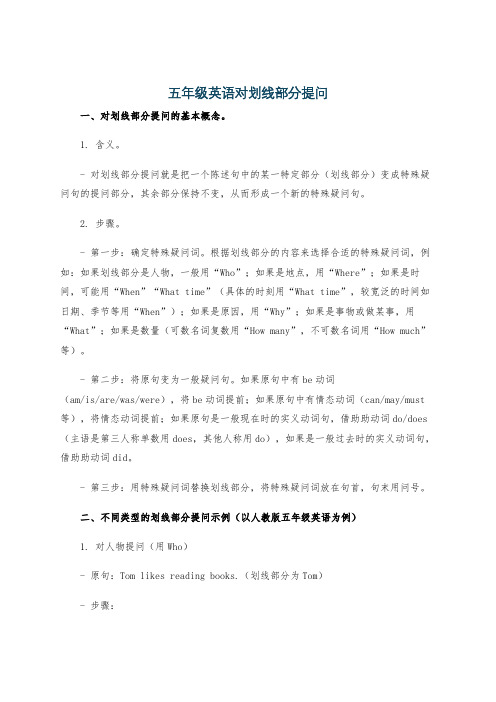
五年级英语对划线部分提问一、对划线部分提问的基本概念。
1. 含义。
- 对划线部分提问就是把一个陈述句中的某一特定部分(划线部分)变成特殊疑问句的提问部分,其余部分保持不变,从而形成一个新的特殊疑问句。
2. 步骤。
- 第一步:确定特殊疑问词。
根据划线部分的内容来选择合适的特殊疑问词,例如:如果划线部分是人物,一般用“Who”;如果是地点,用“Where”;如果是时间,可能用“When”“What time”(具体的时刻用“What time”,较宽泛的时间如日期、季节等用“When”);如果是原因,用“Why”;如果是事物或做某事,用“What”;如果是数量(可数名词复数用“How many”,不可数名词用“How much”等)。
- 第二步:将原句变为一般疑问句。
如果原句中有be动词(am/is/are/was/were),将be动词提前;如果原句中有情态动词(can/may/must 等),将情态动词提前;如果原句是一般现在时的实义动词句,借助助动词do/does (主语是第三人称单数用does,其他人称用do),如果是一般过去时的实义动词句,借助助动词did。
- 第三步:用特殊疑问词替换划线部分,将特殊疑问词放在句首,句末用问号。
二、不同类型的划线部分提问示例(以人教版五年级英语为例)1. 对人物提问(用Who)- 原句:Tom likes reading books.(划线部分为Tom)- 步骤:- 第一步:确定特殊疑问词为Who。
- 第二步:原句是一般现在时的实义动词句,主语是第三人称单数,将原句变为一般疑问句为Does Tom like reading books?- 第三步:用Who替换Tom,得到Who likes reading books?2. 对地点提问(用Where)- 原句:They play football in the park.(划线部分为in the park)- 步骤:- 第一步:确定特殊疑问词为Where。
五年级英语下册期末复习练习四

五年级英语下册期末复习练习四一、句型转换1.That’s a horse in English.(就画线部分提问)_________ _________ in English2.What’s on the desk (回答问题)_________ _________ a pen.3.What’s this in Chinese (同义句)What’s _________ _________ _________ this4.Is it a horse (改为肯定句)_________ _________ a _________ .5.This is a horse. (变该句为复数形式)_____________________________________________________6.We call it a foal. (就画线部分提问)_____________________________________________________7.What’s this in English (用these替换画线部分)_____________________________________________________8.That is a sheep. (改为否定陈述句)_____________________________________________________9.These are kids. (就画线部分提问)_____________________________________________________10.This is a tiger. (改为一般疑问句)_____________________________________________________11.We can call it a bird. (对画线部分提问)_____________________________________________________12.That is a cub. (改为一般疑问句)_____________________________________________________13.We can call it a monkey. (改为一般疑问句)_____________________________________________________14.Is that little bird nice (改为肯定陈述句)_____________________________________________________15.Can your brother swim (改为肯定陈述句)_____________________________________________________ 16.Do you want to be a teacher (改为肯定陈述句)_____________________________________________________ 17.This is a lamb. (改为否定陈述句)_____________________________________________________ 18.These are goslings.(就画线部分提问)_____________________________________________________ 19.Are these lovely chicks yours(改为肯定陈述句)_____________________________________________________ 20.The ducks can swim.(改为一般疑问句)_____________________________________________________ 21.Those are pigs.(改为一般疑问句)_____________________________________________________ 22.Those are shops.(就画线部分提问)_____________________________________________________ 23.Are the little animals funny(改为肯定陈述句)_____________________________________________________24. I read a story in the classmate.(变该句为复数形式)25. Those are English books.(变该句为单数形式)26. We often go to the park on Sunday.(改为一般疑问句)27 . Are those lovely puppies yours(改为肯定陈述句)28. They are elephants. (变该句为单数形式)29 .We have two maths classes. (改为一般疑问句)30. That’s a duck in English.(就画线部分提问)31.There are tiger cubs. (改为一般疑问句)32. There are some monkeys in the picture.(改为否定陈述句) in the picture. 33. Please read English now.(改为否定陈述句)Now.34. We can go to the park next week.(就画线部分提问)you next week35. I would like a cup of tea . ( 一般疑问句 )A cup of tea36. They have two maths classes week. (就画线部分提问)37. I have three friends in my school.(就画线部分提问)38. We have five apples in the bags. (就画线部分提问)39. The boys have ten kittens in the room. (就画线部分提问)40. They often sing in the club. (就画线部分提问)41. Is that little bird nice (改为肯定陈述句)42. Can your brother swim (改为肯定陈述句)43. Do you want to be a teacher (改为肯定陈述句)44. This is a lamb . (改为否定陈述句)45. They want to go shopping.(就画线部分提问)____________________________________________________________46. These are coats.(否定句) ________________________________________47. I think you are right. (否定句)____________________________________48. This is a tiger. (变该句为复数形式)_______________________________49. They have three English classes a week.(变该句为单数形式)_____________________________________________________________50. We often read English in the library. (改为一般疑问句)______________________________________________________________ 51. I have one maths lesson on Monday. (就画线部分提问)______________________________________________________________ 52. We often sing and dance in the music club.(就画线部分提问)______________________________________________________________ 53. There is a computer on the desk.(改为一般疑问句)_______ _________ a computer on the desk54. There is some bread in the bag.(改为一般疑问句)________ __________ ________ bread in the bag55. There is a storybook in the corner.(变为否定陈述句)________ ________ ________ storybook in the corner.56. We read English in the morning.(就画线部分提问)_______ _______ _______ _______ in the morning57. We study plants and animals in the science corner(就画线部分提问)_______ _______ ________ ________ in the science corner58. There are some balloons in the classroom . (改为一般疑问句)________ _________ ________ balloons in the classroom59. There is some water in the bottle.(变为否定陈述句)There ________ ________ _______ in the bottle.60. There are five elephants in the picture.(改为单数)There ________ ________ _____________ in the picture.61. Are there two foals on the field(改为肯定句)_______ ________ ________ ________ on the field.62. We study birds in the forest.(就画线部分提问)________ ________ you __________ birds63. I like science field trips very much.(就画线部分提问)_______ ________ you ________ science _______ __________64. They do exercises at ten.(就画线部分提问)_________ _________ _________ _________ at ten65. We have six pictures.(就画线部分提问)________ ________ _______ _______ _______ ____________66. This storybook is interesting.(改为一般疑问句)__________ _________ __________ __________67. We have six classes every day. (就画线部分提问)_______ _______ _______ _______ ________ _________ every day68. We play hockey on the field.. (就画线部分提问)________ ________ you _________ hockey69. They can watch TV at home. (就画线部分提问)________ __________ they ___________ TV70. They play the violin after school.(就画线部分提问)________ _________ they __________ after school71. There are three girls in the room . (就画线部分提问)_________ _________ _______ ________ _________ in the room72. I can help you. (改为一般疑问句)_____________ I _____________ you73. We can play football in the school. (改为一般疑问句)__________ __________ __________ __________ in the school74. I can draw picture. (就划线部分提问)__________ __________ you __________75. Can the little boy swim in the river (改为肯定陈述句)__________ __________ __________ __________ __________ in the river.76. I can do exercises at home. (改为否定陈述句)I __________ __________ __________ at home.77. These books are eighty yuan.(就画线部分提问)_________ _________ _________ these books78. I can show you my photos.(改为一般疑问句)_________ you _________ me _________ photos79. I can buy shoes in_a_shop.(就画线部分提问)_________ _________ you _________ _________80. We can go_to_the_park next week.(就画线部分提问)_________ _________ you _________ next week81. The watch is seventy-two yuan.(就画线部分提问)_________ _________ _________ the watch82.I would like a cup of tea.(一般疑问句)a cup of tea.83.I can see some trees.(否定句)I trees.84.I can play football in the school.(就画线部分提问)you in the school85.I want to buy a book.(就画线部分提问)you ?86. The walkman is sixty yuan. (就画线部分提问)the walkman.87. I can speak English. (就画线部分提问)you .88. We can do gymnastics in the gym. (就画线部分提问)you in the gym89. The girls can play hockey. (改为单数).90. They can study wild plants in the forest. (改为单数)in the forest.91. The bike is blue . (就画线部分提问)the bike.92. I can walk with my walkman. (改为一般疑问句)you with walkman93. We can play basketball over there. (就画线部分提问)you basketball94. Can your brother write in English (改为肯定陈述句)95. I can buy something with money. (就划线部分提问)96. I can study English at home. (改为一般疑问句)97. There are some shorts in the bag. (改为否定陈述句) 98.Study birds in the forest.(否定句)_______ __________ ________ in the forest.99.Please take him to the hospital.(否定句)________ _______ ________ _______ to the school. 100.Please read English now.(否定句)_________ _______ ________ ________ now.101.I am ill today .(一般疑问句)_________ you ________ today102. I have a bad cold.(用she改写)_______ ________ a bad cold.103. Move your knee.(否定句)_________ _________ ______ __________.104. I have a cold.(一般疑问句)_________ you _______ a cold105. I can go to school today.(否定句)I ______ __________ _________ _________ today.106.They often do exercises at home.(改为单数)He often __________ _______ at home.107. My foot hurts(就画线部分提问)___________ _______ ________ you?108. The Animal Hospital is over there.(就画线部分提问)___________ _________ ___________ ____________ ____________ ?109. Take the book to the room.(改为否定陈述句)_________ _________ _________ _________ to the room.110. Can the girl in red go to school(改为肯定陈述句)_______ ________ _______ __________ ________ go to school. 111. I can do maths problems.(否定陈述句)I__________ _________ ____________ problems.112. We can speak English.(一般疑问句)_________you ___________ ____________113. Can they play hockey (肯定句)They _________ ___________ _______________.114. I can look after your sister. (一般疑问句)_______ _________ _________ after my sister115. Please give the apple to Miss Gao. (同义句)Please give __________ _______ _________ _________.116. The blue coat is mine.(划线提问)_________ ___________ is ______________117. Dick has only one big apple.(划线提问)______ __________ ________ _________ _______ Dick _________ 118. Does the boy with a book study Japanese well (肯定句)The boy ________ ________ ___________ __________ ________ well.119. I like pink best.(同义句)__________ is my __________ ____________.120. All of them like English.(同义句)____________ of them likes English.121. There is an empty box on the chair.(同义句)The box _________ _________ _________ is __________.122. How much are the oranges (同义句)_________ the ___________ _________ the oranges二、连词组句1. things, like ,make , this (.)2. brother , read ,with ,English, your ,home , at (.)3. bike, borrow , friend , a ,from , your (.)4. often , on ,library, Monday , they ,to, go ,the (.)5. they ,horse , a , can, ride ()6. do ,do ,in ,school ,what ,the ,you()7. picture, she ,can, a ,draw(.)8. experiments ,we, class, in, do (.)9. speak ,can, we ,English(.) ___________________________________10. this, nice ,is ,joey () _________________________________________11. other , must , we , each , help (.)__________________________________12. is , lamb , where , the () ________________________________________13. calf ,there , nearby, a, is (.)_______________________________________14. that ,a, cub, lion, is ()___________________________________________15. in, we, forest,birds, the, study (.)_____________________________________________________________16. maths, interesting, our , are, lessons, very (.)_____________________________________________________________17. farmer’s , I,a, work , study , farm , on, the (.)_____________________________________________________________18. job, very, my, like , much , I (.)______________________________________________________________19.a, I ,toothbrush, want ( . )____________________________________________________________________ 20. want, we, combs, some ( . )____________________________________________________________________ 21. they, toothpaste, want, some ( . )____________________________________________________________________ 22. soap, boys, and, want, some, girls, the ( .)____________________________________________________________________ 23. wants, towel, he, a ( . )_________________________________________________24. write, I, to, want(.)_________________________________________________24.I, you, what, do, for, can()_________________________________________________。
小学英语PEP五年级下册对划线部分提问专项训练
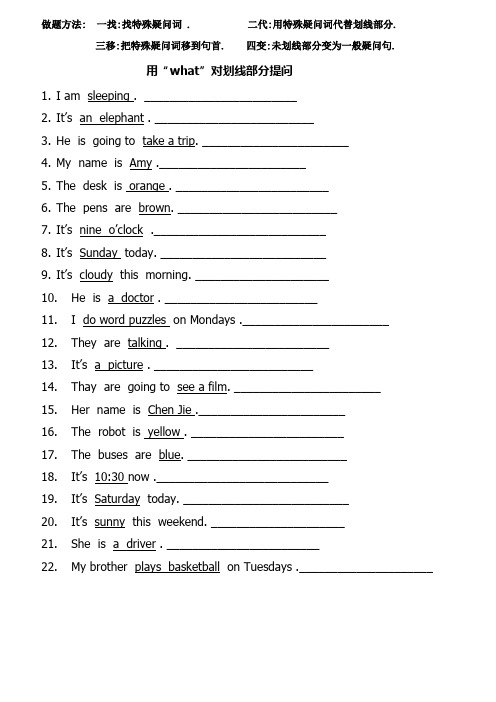
做题方法: 一找:找特殊疑问词 . 二代:用特殊疑问词代替划线部分.三移:把特殊疑问词移到句首. 四变:未划线部分变为一般疑问句.用“what”对划线部分提问1.I am sleeping . ________________________2.It’s an elephant . _________________________3.He is going to take a trip. _______________________4.My name is Amy ._______________________5.The desk is orange . ________________________6.The pens are brown. _________________________7.It’s nine o’clock .___________________________8.It’s Sunday today. __________________________9.It’s cloudy this morning. _____________________10.He is a doctor . ________________________11.I do word puzzles on Mondays ._______________________12.They are talking . ________________________13.It’s a picture . _________________________14.Thay are going to see a film. _______________________15.Her name is Chen Jie ._______________________16.The robot is yellow . ________________________17.The buses are blue. _________________________18.It’s 10:30 now .___________________________19.It’s Saturday today. __________________________20.It’s sunny this weekend. _____________________21.She is a driver . ________________________22.My brother plays basketball on Tuesdays ._____________________用”where”对划线部分提问1.My house is next to the supermarket ._________________________2.I am going to school this evening ._____________________________3. I go to the library on Sundays. ________________________________4. He is in the living room now. ________________________________5.She is under the tree . __________________________________6. They are in the box .____________________________________7.I am from the UK. ______________________________________8.He is from England . __________________________________9.It ‘s behind the hospital . _______________________________10. The picture is on the wall .____________________________11.My parents are at home . ____________________________12.Lucy is in the kitchen . _____________________________13.You can buy books in the bookstore . _________________________14.Mike goes to the supermarket every weekend ._______________________15.She always goes to the park . _____________________________16. The students are in the gym . _________________________________17.Beijing is in China . _________________________18. We will go to the cinema next Monday .__________________________19. You should go to the hospital now . __________________________20.They have breakfast in the restaurant . ____________________________对划线部分提问1.My mother has three children .__________________________2.I get there by bus . ______________________________3.I am ten years old . _______________________________4.He wants to buy three bottles of milk ._________________________5.I am fine . _____________________6.We see eight apples .__________________________7.He gets there by train . ______________________________8.She is fifteen years old . _______________________________9.I like the green one . ________________________10.The black one is mine .____________________________11.He likes summer best . _________________________12.He is my father .________________________13.She is my sister. ____________________________14.The book is mine . _____________________15.Those are your pens . ________________________16.Amy gets up at 10 :30 am. _________________________17.I go to school on Mondays. _________________________18.She is going to see a doctor this morning .______________________________________19.I like bananas.(用why提问)_____________________20.She is going to go home. (用why提问)_____________________。
PEP五年级英语下册第五单元AB及单元测试题.doc

Unit 5 Whose dog is it?检测题(A)听力部分(30分)1. 听录音,选出你所听到的单词。
(10分))1. These storybooks are mine. )2. The book is Mike's. )3. That dog is Amy's.)4. The beautiful picture is Zhang Pengs. ()5. The dog is John and Amy ,s.笔试部分(70分)IV.选出每组单词中不同类的i 项。
(10分) ( )1. A. your B. her C. his ( )2. A. my B. mine C ・ yours()3. A. ourB. theirsC.your( )4. A. Lily B. Amy's C. Sarah's()5. A. she B. we C. hers V. 选择填空。
(10分)( )1 • — cap it it? 一 -It^ Zhang Peng's.A. WhoB. WhatC. Whose()2. There is a beautiful picturethe Great WallA. forB. ofC. to( )3. Look! That red skirt is nice. It^s _______________ .A. Chen Jie'sB. Chen JieC. Chen Jies'( )4. Those are _______ storybooks ・ Those storybooks are _________A. our; ourB. our; oursC ・ ours; our ()5. The green picture is _____________ • A. mine B. me C ・ myVI. 用所给单词的正确形式填空。
最新五年级英语就划线部分提问的要点归纳及练习

最新五年级英语就划线部分提问的要点归纳及练习小学英语就划线部分提问复习“就划线部分提问”是小学阶段英语学习的难点,但是一旦掌握了规律,就变得容易多了。
小学英语对划线部分提问之答题口诀:一代(用正确的疑问词代替划线部分),二移(把疑问词移至句首)三倒(颠倒主谓语,但对主语或其定语提问时除外)四抄(照抄句子剩余部分)☆总结关键就是:“特殊疑问词+一般疑问句”(即:先根据划线部分找到特殊疑问词;再把没划线的部分变成一般疑问句的语序。
) ★特殊疑问词的确定要根据划线内容而定,在小学阶段常出现的有以下几种:1、划线部分是“事或物”,特殊疑问词用what如: This is a book.---What is this?I often play football on Saturdays .---What do you often do on Saturdays ?2、划线部分是“人”,特殊疑问词用who如:He is my brother. ---Who is he ?3、划线部分是“地点”,特殊疑问词用where如:The box is on the desk.---Where is the box ?4、划线部分是“时间”,特殊疑问词用what time或when如:It's seven twenty . ---What time is it ?I usually get up at six . --- When do you usually get up?5、划线部分是“年龄”,特殊疑问词用how old如:I am twelve . ---How old are you?My father is thirty-three . ---How old is your father ?6、划线部分是“职业”,特殊疑问词用what如:Mike is a worker. ---What is Mike ?7、划线部分是“颜色”,特殊疑问词用what colour如: My hat is blue . ---What colour is your hat?8、划线部分是“数量”,特殊疑问词用how many或how much如:I can see five kites .---How many kites can you see ?There is some milk in the glass. ---How much milk is there in the glass ?9、划线部分是“多少钱”,特殊疑问词用how much如:This pen is nine yuan . ---How much is this pen ?10、划线部分是“形容词性物主代词或名词性物主代词”,特殊疑问词用whose如:That is my book . ---Whose book is that ?The bag is yours. ---Whose is the bag ?以下口诀要牢记:1.问“谁”用who;2.问“谁的”,用whose;3.问“地点哪里”,用where;4.问“原因”,用why;5.问“身体状况”,用how;6.问“方式”,用how;7.问“年龄”,用how old;8.问“多少”,用how many;9.问"价钱”用how much;10.问“哪一个”,用which ;11.问“什么”,用what;12.问“职业”,用what;13.问“颜色”,用what colour;14.问“星期”,用what day;15.问什么学科,用what subject;16.问“什么时候”,用when;17.问几点用What’s the time?或What time is it?精品文档训练题1. That car is yellow. (提示:问颜色)_____ _____ is that car?2. My sister is 15 years old. (提示:问年龄)______ _____ is your sister?3. The glasses are Jim’s. (提示:问归属)______ glasses are these?4. Ann collected shells last Sunday.(提示:问”谁”)______ collected shells last Sunday?5. There were eleven books in my bag.(提示: 问数量)______ ______ books are there in your bag?6. I visited my teachers on Teacher’s Day.(提示:问时间) _______ did you visit your teachers?7. It means “Do not touch”.(提示:问”什么”)_______ does it mean?8. I’m fine, thank you.(提示: 问怎么样)______ are you?9. I go to school by bus.(提示:问方式)______ do you go to school?10,We go to school five times a week.(提示:问频率)_______ ______ do you go to school?11. I’m in Class 3.______ _______ are you in?12. The panda is black and white._____ ______ is the panda?13. Her kite is under the bed._____ ______ her kite?14. I come to school by bike._____ _____ you come to school?15. Ben has a birthday present. _____ does Ben have?16. Mother bought a gift for me._____ did mother buy a gift for?17. I can hear a bus._____ can you hear?18. Tony lives at 26 Lunwan Street._____ does Tony live?19. Bob is wearing a blue hat._____ is wearing a blue hat?20. This is Ben’s English book._____ English book is this?对划线部分提问练习1. His father is an engineer.(对划线部分提问)______ his father’s ___ ____?2. My first name is Tom.(改为同义句)My __ _____ ________ is Toms.3. Mr King is from America.(对划线部分提问)______ is Mr King _____ ___?4. Jenny is English.(对划线部分提问)What’s ________ ______ ___?5. He’s an actor.(变为复数)____ __ are _____ ____.6. Jack has a basketball.(改为否定句)7. I have three cousins.(对划线部分提问)精品文档。
小学英语五年级下册句型转换专题练习附答案解析
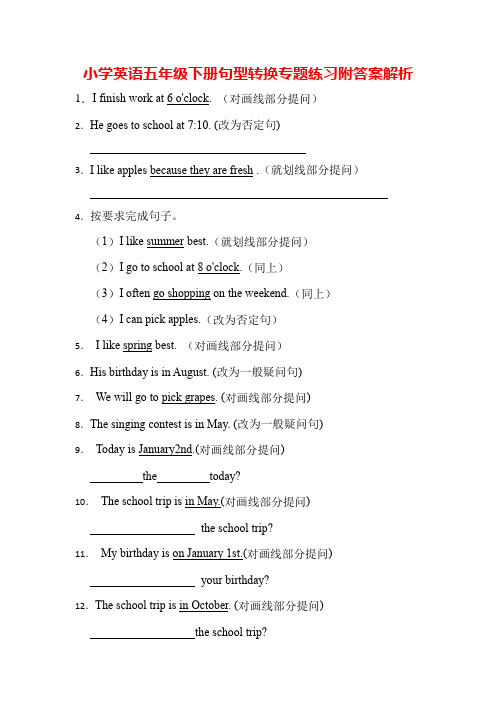
小学英语五年级下册句型转换专题练习附答案解析1.I finish work at 6 o'clock. (对画线部分提问)2.He goes to school at 7:10. (改为否定句)3.I like apples because they are fresh .(就划线部分提问)4.按要求完成句子。
(1)I like summer best.(就划线部分提问)(2)I go to school at 8 o'clock.(同上)(3)I often go shopping on the weekend.(同上)(4)I can pick apples.(改为否定句)5.I like spring best. (对画线部分提问)6.His birthday is in August. (改为一般疑问句)7.We will go to pick grapes. (对画线部分提问)8.The singing contest is in May. (改为一般疑问句)9.Today is January2nd.(对画线部分提问)the today?10.The school trip is in May.(对画线部分提问)the school trip?11.My birthday is on January 1st.(对画线部分提问)your birthday?12.The school trip is in October. (对画线部分提问)the school trip?13.Springis my favourite season. (对画线部分提问)favourite season?14.Oliver will have a birthday cake. (对画线部分提问)Oliver have?15.Which season do you like best?(改为同义句)your season?16.He picks apples on the weekend. (变否定句)He apples on the weekend.17.I usually go shopping on Sundays. (对画线部分提问)do you usually on Sundays?18.I go to bed at about nine o'clock. (对画线部分提问)you go to bed?19.I like winter because I can make a snowman. (对画线都分提问)you like winter?20.Linda is in the classroom. (对画线部分提问)Linda?21.Which season do you like best?(写出同义句)22.I like summer best. (对划线部分提问)23.Dragon Boat Festival is usually in June. (改为一般疑问句) 24.I usually play sports with my friends on weekend. (改为否定句)25.It's rainy and cool in Nanjing. (对画线部分提问)the weather in Nanjing?26.We can plant trees in spring.(改为一般疑问句)you trees in spring?27.I like winter.(改为否定句)I winter.28.Winter is my favourite season.(改为同义句)is winter.29.My brother likes summer because he can swim in the lake. (对画线分提问)your brother summer? 30.Mike's birthday is on September 9th.(就画线部分提问)31.What's your favourite season?(改为同义句)32.Is the tiger swimming?(做肯定回答)33.I cook rice. (用现在进行时改写句子)34.I can read the books here. (变成一般疑问句句)35.I usually clean my room on the weekend. (对划线部分提问) 36.These are Mike's photos. (对划线部分提问)。
(word完整版)五年级英语句型转换(含答案),推荐文档

按要求改写句子1.That’s a horse in English.(就画线部分提问)What’s_ that _ in English?2.What’s on the desk? (回答问题)___There_____ ___is_____ a pen.3.What’s this in Chinese? (同意句)What’s ___the _____ _Chinese_______ __for______this?4.Is it a horse? (肯定句)___It _____ ___is_____ a ___horse_____.5.This is a horse. (变复数形式)__These ________ ___are_______ __horses________6.We call it a foal. (就画线部分提问)__What_____ __do______ __you_____ _call______ ___it_____?7.What’s this in English? (用these替换划线部分)_What______ __are_____ __these_____ __in______ __English______? 8.That is a sheep. (变否定句)__That________ _isn’t_________ ____a______ _____sheep_____.9.These are kids. (就画线部分提问)__What____ __are_____ _these_____?10.This is a tiger.(一般疑问句)__Is________ __this_____ ___a_____ __tiger_____?11.We can call it a bird.(画线部分提问)__What_____ __can______ _you______ ___call_____ ____it____?12.That is a cub.(一般疑问句)___Is____ __that____ ___a____ ___cub____?13.We can call it a monkey. (一般疑问句)__Can____ ___you____ __call_____ ___it____ ____a__ ___monkey____?14.Is that little bird nice? (肯定句)_That_____ _little_____ __bird______ ___is____ ___nice____.15.Can your brother swim? (肯定句)___My____ __brother____ ___can_____ ___swim____.16.Do you want to be a teacher? (肯定句)__I_____ __want_____ ___to_____ __be______ __a_____ ___teacher____.17.This is a lamb. (否定句)___This_______ __isn’t____ _a_____ __lamb____.18.These are goslings. (对画线部分提问)__What are __ these_____?19.Are these lovely chicks yours? (改肯定陈述句___These lovely chicks are mine____20.The ducks can swim. (改一般疑问句)__Can the ducks swim?_______________21.Those are pigs. (一般疑问句)___Are those pigs?____________________22.Those are shops. (就画线部分提问)____What are those?__________________23.Are the little animals funny? (肯定句)___The little animals are funny.______________24.I read a story in the classroom. (变该句为复数形式)We read stories in the classroom,.25.Those are English books. (变该句为单数形式)That is an English book.26.We often go to the park on Sunday. (改为一般疑问句)Do you often go to the park on Sunday?27.Are those lovely puppies yours? (改为肯定陈述句)Those lovely puppies are mine.28.They are elephants. (变该句为单数形式)It is an elephant.29.We have two maths classes. (改为一般疑问句)Do you have two maths classes?30.That’s a duck in English. (就画线部分提问)What’s that in English?31.These are tiger cubs. (改为一般疑问句)Are these tiger cubs?32.There are some monkeys in the picture. (改为否定陈述句)There aren’t any monkeys in the picture.33.Please read English now. (改为否定陈述句)Please don’t read English now.34.We can go to the park nest week. (就画线部分提问)What can you do next week?35.I would like a cup of tea. (一般疑问句)Would you like a cup of tea?36.They have two maths classes a week. (就画线部分提问)How many maths classes do they have a week?37.I have three friends in my school. (就画线部分提问)How many friends do you have in your school?38.We have five apples in the bags. (就画线部分提问)How many apples do you have in the bags?39.The boys have ten kittens in the room. (就画线部分提问)Where do the boys have ten kittens?40.They often sing in the club. (就画线部分提问)Where do they often sing?41.Is that little bird nice? (改为肯定陈述句)That little bird is nice.42.Can your brother swim? (改为肯定陈述句)My brother can swim.43.Do you want to be a teacher? (改为肯定陈述句)I want to be a teacher.44.This is a lamb. (改为否定陈述句)This isn’t a lamb.45.They want to go shopping. (就画线部分提问)What do they want to do?46.These are coats.(否定句)These aren’t coats.47.I think you are right.(否定句)I don’t think you are right.48.This is a tiger.(变该句为复数形式)These are tigers.49.They have three English classes a week.(变该句为单数形式)He has an English class a week.50.We often read English in the library.(改为一般疑问句)Do you often read English in the library?51.We often sing and dance in the music club.(就画线部分提问)What do you often do in the music club?52.I have one maths lesson on Monday.(就画线部分提问)How many maths lessons do you have on Monday?53.There is a computer on the desk.(改为一般疑问句)___Is________ ___there________ a computer on the desk?54.There is some bread in the bag. (改为一般疑问句)____Is _______ ___there________ ____any_______ bread in the bag? 55.There is a story book in the corner.(改为否定陈述句)____There_______ ___isn’t________ ____a_______ story book in the corner.56.We read English in the morning. in the morning.(就画线部分提问)___What________ ____do_______ ____you_______ ____do_______ in the morning?57.We study plants and animals in the science corner. (就画线部分提问)__What_________ __do_________ ___you________ __study_________ in the science corner?58.There are some balloons in the classroom. (改为一般疑问句)Are there any balloons in the classroom?59.There is some water in the bottle. (改为否定陈述句)Thereisn’t any water in the bottle.60.There are five elephants in the picture. (改为单数)There is an elephant in the picture.61.Are there two foals on the field? (改为肯定句)There are two foals on the field.62.We have six classes every day. (就画线部分提问)How many classes do youhave every day?63.We play hockey on the field. (就画线部分提问)Where do you play hockey? 64.They can watch TV at home. (就画线部分提问)Where can they watch TV? 65.They play the violin after school. (就画线部分提问)What do they do after school? 66.There are three girls in the room. (就画线部分提问)How many girls are there in the room?67.We study birds in the forest. (就画线部分提问)Where do you study bird?68.I like science field trip very much. (就画线部分提问)How do you like science fieldtrip ?69.They do exercises at ten. (就画线部分提问)What do they do at ten? 70.We have six pictures. (就画线部分提问)How many pictures do you have ?71.This storybook is interesting. (改为一般疑问句)Is this storybookinteresting ?72.I can help you.(改为一般疑问句)__Can______ I ____help____ you?73.We can play football in the school.(改为一般疑问句)__Can______ __you______ _play_______ _football_______ in the school?74.I can draw pictures.(就划线部分提问)__What______ ___can___ __ you _ _do______?75.Can the little boy swim in the river?(改为肯定陈述句)___The _____ ___little _____ __boy______ ___can_____ ___swim_____ in the river.76.I can do exercises at home. (改为否定陈述句)I__can’t ______ ____do____ __exercises______ at home.77.I would like a cup of tea . (改为一般疑问句)Would you like a cup of tea?78.I can see some trees . (改为否定陈述句)I can’t see any trees.79.I can play football in the school . (就划线部分提问)What can you play in the school?80.I want to buy a book . (就划线部分提问)What do you want todo ?81.The walkman is sixty yuan.(就划线部分提问)__How______ __much______ _is_______ the walkman?82.I can speak English. (就划线部分提问)_What_______ ____can____ you __do______?83.The girls can play hockey.(改为单数)__The______ _girl_______ __can______ __play______ _hockey_______. 84.They can study wild plants in the forest.(改为单数)___He_____ __can______ __study______ ___a_____ ___wild________plant_____in the forest.85.The bike is blue. (就划线部分提问)___What_____ __colour______ ___is_____ the bike?86.15.I can walk with my walkman. .(改为一般疑问句)___Can_____you __walk______ with __your______ walkman?87.We can play basketball over there.(就划线部分提问)__Where______ ___can__ __ you _ _play_____ basketball?88.These books are eighty_yuan. (就划线部分提问)__How______ __much______ _are_______ these books?89.I can show you my photos. (改为一般疑问句)__Can ______you __show______me _ __ your___ photos?90.I can buy shoes in a shop. (就划线部分提问)__Where______ __can______ you __buy______ __shoes______?91.We can go to the park nest week. (就划线部分提问)___What______can_______you___do_____next week?92.The watch is seventy-two yuan. (就划线部分提问)_How_______ __much______ _is_______ the watch?93.Can your brother write in English? (改为肯定陈述句)__My brother can write in English.________________94.I can buy something with money. (就划线部分提问)__What can you buy with money?__________________95.I can study English at home. (改为一般疑问句)__Can you study English at home?_________96.There are some shorts in the bag. (改为否定陈述句__There aren’t any shorts in the bag.________________________97.I can do maths problems. (改为否定陈述句)I can’t do maths problems.98.We can speak English. (改为一般疑问句)Can you speak English ? 99.Can they play hockey? (改为肯定陈述句)They can play hockey . 100.I can look after your sister. (一般疑问句)Can you look after my sister.101.Please give the apple to Miss Gao. (同义句)Please give Miss Gao theapple .102.The blue coat is mine. (就画线部分提问)Which coat is yours .103.Dick has only one big apple. (就画线部分提问)How many big apples doesDick have ?104.Does the boy with a book study Japanese well? (肯定句)The boy with a book studiesJapanese well.105.I like pink best. (同义句)Pink is my favourite colour . 106.All of them like English. (同义句)Each of them likes English.107.There is an empty box on the chair. (同义句)The box on the chair isempty .108.How much are the oranges? (同义句)What’s the price of the oranges? 109.My foot hurts. (就画线部分提问)What’s wrong with you? 110.The Animal Hospital is over there. (就画线部分提问)Where is the AnimalHospital ?111.Take the books to the room. (改为否定陈述句)Don’t take the books to the room. 112.Can the girl in red go to school? (改为肯定陈述句)The girl in red can go to school.113.Study birds in the forest. (改为否定陈述句)Don’t study birds in the forest.114.Please take him to the school. (改为否定陈述句)Please don’t take him to the school. 115.Please read English now. (改为否定陈述句)Please don’t read English Now. 116.I am ill today. (改为一般疑问句)Are you ill today?117.I have a bad cold. (把主句变为she改写该句)She has a bad cold.118.Move your knee.(改为否定句)Don’t move your knee119.I have a cold.(改为一般疑问句)Do you have a cold?120.I can go to school today. (改为否定句)I can’t go to school today.121.They often do exercises at home.(改为单数形式)He often does exercises at home.组句122.in, we, forest, birds, the, study ( . )We study birds in the forest.123.maths, interesting, our, are, lessons, very( . )Our maths lessons are very interesting.124.farmer’s, I, a, work, study, farm, on, the ( . )I study a farmer’s work on the farm.125.job, very, my, like, much, I ( . )I like my job very much.126.things, like, make, t his(.)Make things like this.127.brother, read, with, English, your, home, at(.) Read English with your brother at home. 128.bike, borrow, friend, a, from, your(.)Borrow a bike from your friend.129.often, on, holiday, Monday, they, to, go, the(.) They often go to the holiday on Monday. 130.they, horse, a, can, ride(?)Can they ride a horse?131.do, do, in, school, what, the, you(?)______What do you do in the school?________ 132.picture, she, can, a, draw(.)___She can draw a picture._________________ 133.experiments, we, class, in, do(.)___We do experiments in class.______________ 134.speak, can, we, English(.)___We can speak English.___________________ 135.this, nice. is, joey (?)_____Is this joey nice?______________________ 136.other, must, we, each, help (.)___We must help each other.________________ 137.is, lamb, where, the (?)___Where is the lamb?____________________ 138.calf, there, nearby, a, is (.)____There is a calf nearby._________________ 139.that, a, cub, lion, is(?)____Is that a lion cub? __________________。
句型——就划线部分提问讲解及习题(学案)2023-2024学年英语五年级上册-人教PEP版(含答案)

句型——就划线部分提问讲解及习题(学案)20232024学年英语五年级上册人教PEP版(含答案)教学目标:1. 能理解并在适当的语境中运用一般疑问句进行提问和回答。
2. 能正确运用所学的词汇和句型进行简单的交流。
3. 培养学生的听说能力和团队协作精神。
教学内容:1. 词汇:球类、颜色、数字等。
2. 句型:就划线部分提问。
教学重点与难点:1. 重点:掌握一般疑问句的构成和用法。
2. 难点:如何在实际情境中运用一般疑问句进行提问和回答。
教具与学具准备:1. 教具:PPT、黑板、粉笔。
2. 学具:课本、练习册、文具。
教学过程:Step 1:Review(复习)1. 老师通过PPT复习上节课学过的词汇和句型。
2. 学生跟读,巩固记忆。
Step 2:Presentation(新课展示)1. 老师通过PPT展示新课的词汇和句型。
2. 老师用实例解释一般疑问句的构成和用法。
3. 学生认真听讲,理解新知识。
Step 3:Practice(练习)1. 老师组织学生进行小组活动,用所学的词汇和句型进行交流。
2. 学生积极参与,练习提问和回答。
Step 4:Consolidation(巩固)1. 老师选取一些习题,让学生进行抢答。
2. 学生运用所学的句型进行提问和回答。
板书设计:1. 一般疑问句的构成:疑问词 + 动词原形 + 其它?2. 一般疑问句的用法:用于询问事物的名称、颜色、数量等。
作业设计:1. 抄写新学的词汇和句型。
2. 完成课后习题。
课后反思:本节课通过讲解和练习,使学生掌握了句型——就划线部分提问的用法。
在教学过程中,注意引导学生运用所学知识进行实际交流,提高学生的听说能力。
同时,鼓励学生积极参与课堂活动,培养学生的团队协作精神。
重点关注的细节:教具与学具准备补充说明:a. 设计简洁明了,避免过于繁琐的信息。
b. 使用鲜艳的颜色和生动的图片,吸引学生的注意力。
c. 结合教学内容,设计具有针对性的问题和练习。
- 1、下载文档前请自行甄别文档内容的完整性,平台不提供额外的编辑、内容补充、找答案等附加服务。
- 2、"仅部分预览"的文档,不可在线预览部分如存在完整性等问题,可反馈申请退款(可完整预览的文档不适用该条件!)。
- 3、如文档侵犯您的权益,请联系客服反馈,我们会尽快为您处理(人工客服工作时间:9:00-18:30)。
方法:用特殊疑问词代替划线部分,其余变为一般疑问句,放在特殊疑问词后,注意:
划线部分千万不要在句子中出现。
1.就名字提问 , 用 what
(1) My name’s Zhou Pei.
(2) His name is Tom.
(3) Her name is Mary.
2.就班级 / 年级提问 , 用 what
(4)I ’ m in Class One.
(5)He is in Grade Four.
(6)They are in Class Three.
3.就人提问 , 用 who
(7)He is Bob.
(8)That girl is my new friend.
(9)She ’ s my aunt.
(10)Theyare my grandfather and grandmother.
4.就年龄提问 , 用 how old
(11)She ’s ten.
(12)They are twelve.
(13)I’ m eleven.
(14)My brother is four.
5.就地点提问 , 用 where
(15)He is from France. (16)I ’ m from China.
(17)I come from New Zealand.
(18)He comes from Australia.
(19)They come from Japan.
(20)The ball is in the box.
(21)They work in a factory.
(22)My uncle works in a bank.
6.就职业提问 , 用 what
(23)She ’ s a nurse.
(24)My dad is a doctor.
7.就所属提问 , 用 whose
(25)These are my books.
(26)That is his panda.
(27)This is Bob’ s mug.
8.就事物提问 , 用 what
(28/)This is a book.
(29)That ’ s a camera.
(30)They are apples.
9.就数量提问 , 用 how many
(31)There are four people in my family.
(32)I have five pencils.
(33)I can see two pens on the desk.
10. 就时间提问 , 用 what time (34) It’ s four o’ clock.
(35)He goes to school at seven.
答案
’ s your name?
is his name?
3.What is her name?
4.What class are you in?
5.What grade is he in?
6.What class are they in ?
7.Who is he ? 8.Who is that girl ?
9.Who ’ s she?/ Who is she?
10.Who are they?
11.How old is she ?
12.How old are they ?
13.How old are you?
14.How old is your brother ?
15.Where is he from ?
16.Where are you from ?
17.Where do you come from ?
18.Where does he come from ?
19.Where do they come from?
20.Where is the ball?
21.Where do they work ?
22.Where does your uncle work ?
23.What is she?
24.What’s your dad? / what is your dad?
25.Whose books are these?
26.Whose panda is that?
27.Whose mug is this?
28.What is this ?
29.What is that?
30.What are they?
31.How many people are there in your family?
32.How many pencils do you have?
33.Howmany pens can you see on the desk?
34.What time is it?
35.What time does he go to school?
陈述句变一般疑问句规则
1.当句中有 be 动词时 , 把 be 动词提到句子
前面 , 其他照写 , 第一人称变为第二人称 . (1)This is a book..
Is this a book?
(2)My father is a doctor. Is
your father a doctor?
(3)These books are new.
Are these books new?
(4) I ’ m a student.
Are you a student?
2.动词是 have 时, 句首加 do, 其他照写 ,
动词是has时,句首加does,其他照写, has 变为 have.
(1) I have a book.
Do you have a book?
(2) He has big eyes.
Does he have big eyes?
3.没有 be 动词 , 看句中动词 , 如果是动词原形 , 在句首加 do, 第一人称变为第二人称 . (1) I go to school at seven.
Do you go to school at seven? (2)They work in a bank.
Do they work in a bank?
如果动词是第三人称单数形式,变为一般疑问句时 , 在句首加does,其他照写,动词变为原形 , 第一人称变为第二人称.
(1)He works in a school.
Does he work in a school?
(2)Lily comes from England. Does
Lily come from England?
4.句中含有情态动词 can 时 , 把 can 提前 , 其他照写 , 第一人称变为第二人称.
(1)I can see a picture on the wall. Can
you see a picture on the wall?
(2)He can swim.
Can he swim?
名型 :
How many +可数名词复数 +一般疑问句 ? 例:
How many balls are there on the desk?
How many books do you have?。
